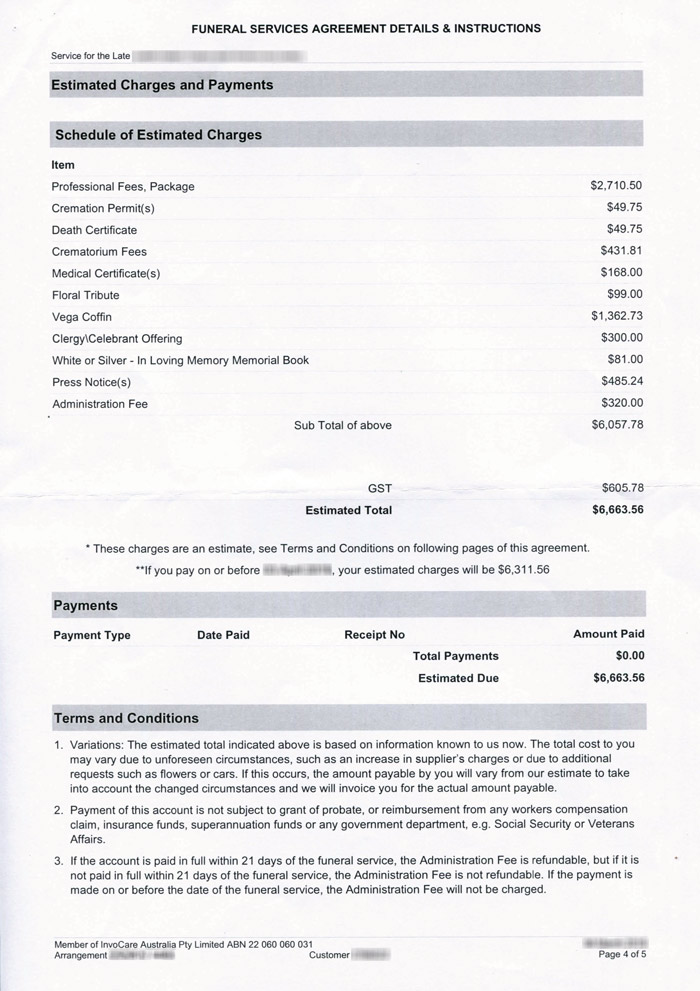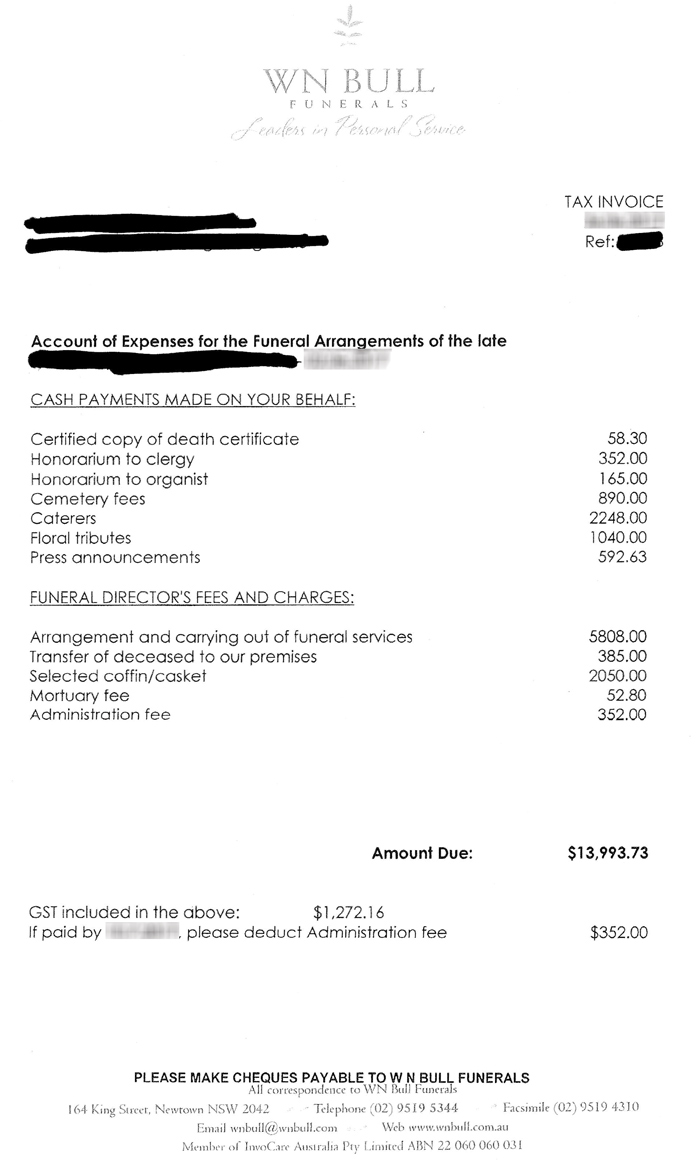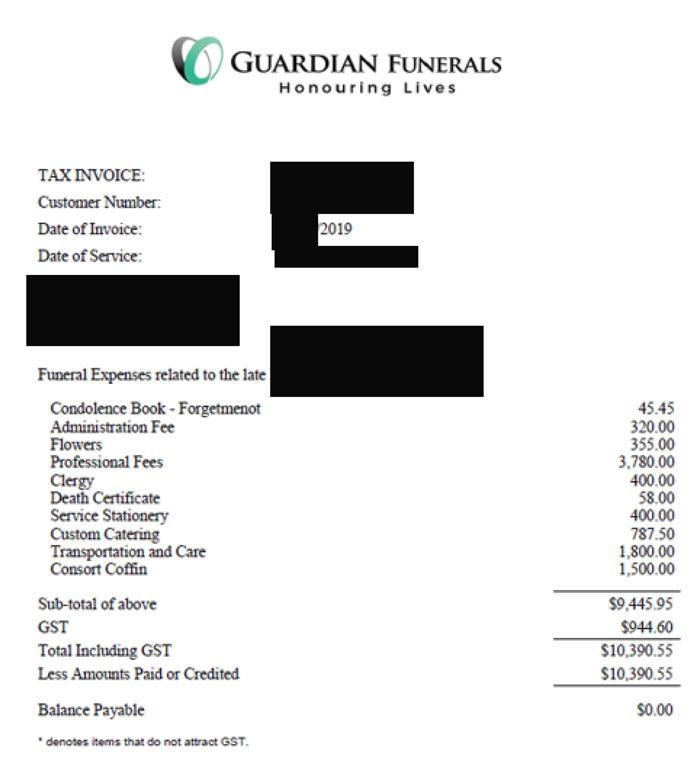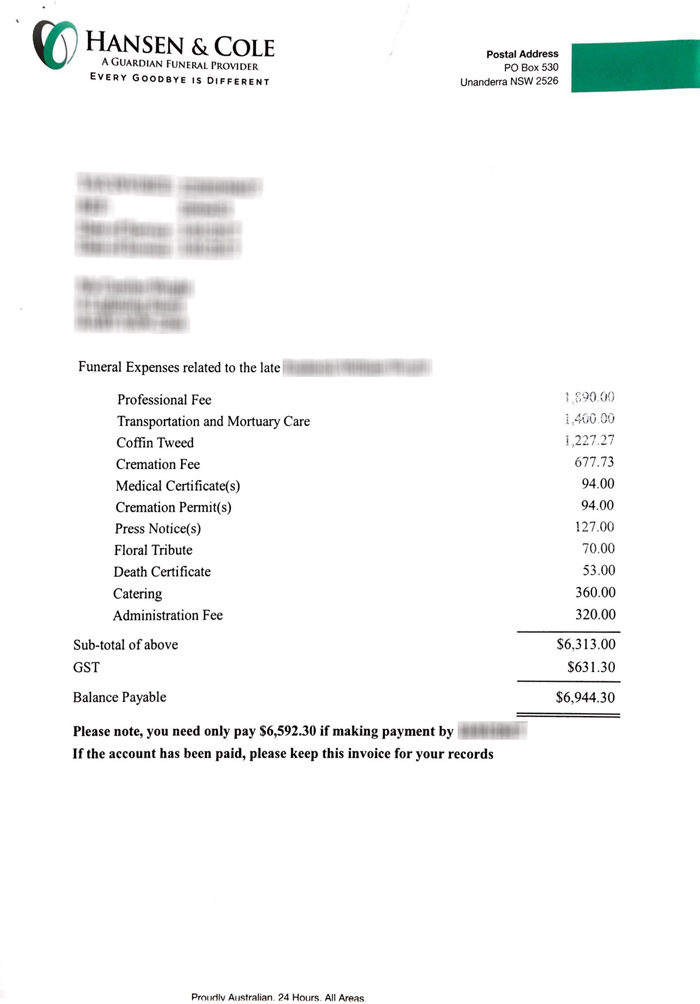Get our independent lab tests, expert reviews and honest advice.
Funeral giant invoices for late payment fees – before you’re late

Need to know
- Mourners often don't realise that the “administration fee” that appears on their invoice is actually a late payment fee, billed in advance
- InvoCare applies late fees by default, putting the onus on mourners who pay on time, and their funeral directors, to deduct the fee from the total
- CHOICE has submitted a complaint to the ACCC arguing that InvoCare has breached consumer law
InvoCare, the operator of more than 250 funeral homes, cemeteries and crematoriums in Australia, says it sets the highest standards for “fair business practice”. But there’s a rift between what the company says and what it does.
InvoCare is Australia’s largest provider of funeral services. In 2018, it sold almost 36,000 funerals for a total of nearly $290 million dollars nationally, and held a third of the metropolitan market.
Its unrivalled size means the company has a significant influence on the way funeral pricing works across Australia, enabling it to set high prices for funerals and issue invoices with troubling quirks.
A late fee by any other name…
Following a tip-off from an industry insider, we investigated the billing practices of the funeral giant and found one feature particularly perplexing. It’s called an “administration fee” and costs $352 including GST.
The administration fee functions like a late fee, designed to prevent people paying later than three weeks after the funeral. If you don’t want to pay the fee, you have to pay the full bill within three weeks.
But there’s an important catch: this late fee, masquerading as an administration fee, is applied upfront.
If you pay on time, the onus is on you or your funeral director to subtract the late fee from the total – and to pick up on an overpayment if it happens
As an example, let’s take an invoice from InvoCare’s Simplicity Funerals.
The invoice lists a professional fee, coffin, cremation fee, cremation permit, death certificate and the “administration fee”, along with the price of each item.
The “balance payable” – that is, the total tally of these costs – is $6778.99, which includes the $352 ($320+GST) fee for late payment (the opaquely named “administration fee”).
Then, there’s a separate instruction at the bottom of the invoice: “Please note, you need only pay $6426.99 if making payment by 13/02/2018”.
Jacinta Gale, InvoCare’s PR manager, says the point of listing the late fee on invoices is “so all families are aware of the fee and also the balance payable if paid within 21 days”.
But if you pay within three weeks, the onus is on you or your funeral director to subtract the administration fee from the total – and to pick up on an overpayment if it happens.

Because the vaguely named fee is applied by default, there’s a good chance that people will pay it without realising, despite settling the bill within three weeks. And this is arguably more likely if they’re distracted by grief at the loss of a loved one.
Our industry source puts it this way: “It is a straight out revenue grab from unsuspecting, vulnerable customers.”
An invoice we’ve seen from InvoCare’s Guardian Funerals shows that a customer paid the full cost of the funeral in advance, and was still charged – and paid for – an administration fee, not realising it was actually a late fee they didn’t need to pay.
Gale says it “sounds like the family has made a mistake” in accidentally paying the sum that included the administration fee, and should be refunded. She says incidents like this would be “by far the exception, an anomaly”.
She emphasises the fact that the administration fee is explained in the terms and conditions of the contract customers sign ahead of the funeral. But this disclosure is not given with the invoice they receive afterwards.
Familiar tricks
A report published in October by ASIC and the Dutch Authority for Financial Markets points out that disclosure doesn’t protect consumers from the complexity that firms deliberately create through tactics such as “bundled products and pricing, confusing and opaque ‘discounts’, [and] unclear fee descriptors”. These examples from the financial sector are just as applicable to the funeral industry.
According to the report: “Strategies such as these can confuse us and/or take advantage of our confusion, and defeat our attempts to engage with or understand even simplified disclosure.”
InvoCare’s tactic might be compared with the financial industry’s fees for no service unearthed in the banking royal commission. But where banks were charging fees for services that never got delivered, InvoCare’s fee was never meant to be for a service. Its purpose, when applied as intended, is to penalise people for delaying payment.
Our industry insider points out that the $352 administration fee, in some cases, will cost more than flowers, clergy and other items on a funeral invoice. “But the customer gets nothing for it. If it was a genuine late fee, $352 is out of line of any reasonable or justifiable cost,” they say. “It is a complete gouge of customers.”
Late payment fees, as we’ve seen in the energy sector, are more likely to punish poor people. The ACCC’s electricity pricing report found that people “facing particular hardship and socioeconomic barriers” are more likely to miss payment deadlines. It also addressed the problem of retailers charging late payment penalties disguised as pay-on-time discounts.
InvoCare’s administration fee works in a similarly misleading way. Several of the company’s customers who sent us their invoices described the amount they paid as “discounted”.
That suggests they believe the sum they paid was a markdown from the original price of the funeral, when in fact they were paying the true cost – just excluding a late fee they had been preemptively billed. None of them could remember thinking anything of the so-called administration fee, which creates the false impression of being a fee for a service.

Gale says it’s called an administration fee because it “covers the administration needed to follow up accounts outside of the 21 day terms”.
But Geoff, a Simplicity Funerals customer, holds a different assumption of what the administration fee covers, in light of its name: “I assume that it covers the office services such as photocopying, typing documents, phone calls etc., but now that you draw my attention to it I wonder why these charges aren’t included in the first item, ‘Professional Fees, Package’. Perhaps each funeral has differing needs to be covered.”
A breach of trust
The term “administration fee”, according to a complaint CHOICE has submitted to the ACCC, is “misleading because the fee does not cover any type of service, and therefore operates as a preemptive penalty”.
It’s illegal for a business to make statements that are likely to create a false or misleading impression.
And, by including a preemptive late fee in customers’ total funeral cost, InvoCare appears to be in breach of the Australian Consumer Law, which states that businesses have to give you the minimum total price of a product or service as a single figure.
In the complaint, CHOICE describes the way InvoCare bills late fees as “unconscionable because of the particular vulnerabilities of funeral consumers and InvoCare’s full knowledge of their special disadvantage”.

Crucially, InvoCare’s customers consist almost entirely of vulnerable people – the recently bereaved who not only have to cope with their emotions, but also have to tie up the practical loose ends that follow a death.
In a time of great stress and grief, most mourners will rely on their funeral directors’ benevolence rather than dissect the information they’re given. This makes funerals different from other expensive purchases, for which people are more likely to be in a frame of mind to recognise a fee that doesn’t belong on their bill.
Andrew, a customer of InvoCare’s White Lady Funerals, says he delayed paying for his father’s funeral, which cost $20,302, until weeks after the due date because “it was a large sum of money and I was too shocked and frozen to do anything for the first month to even manage issues like the payment and feeling normal again”.
When he asked White Lady Funerals why they were charging him $20,654 instead of the original $20,302, the funeral home allowed him to pay the quoted amount.
I was too shocked and frozen to do anything for the first month to even manage issues like the payment and feeling normal again
Andrew, White Lady Funerals customer
“It was my duty to pay them on time or earlier,” Andrew says, though he thinks a $352 late fee is too much.
For a Guardian Funerals customer who paid $10,000 upfront for an $11,749 funeral, the looming penalty, proportional to the remaining amount he owed, was hefty. The invoice he received on the day of the service still included the $352 administration fee, representing an additional 20% of the $1749 outstanding. Fortunately, he paid the correct, smaller amount excluding the fee, without any issues.
If InvoCare named the administration fee for what it was, would mourners so readily accept its inclusion on their account of funeral expenses?

As it stands, the industry source believes the company “knows full well that the majority of customers will not notice, never complain” and sees the fee as just one example of why “regulation and transparency is needed in the industry”.
Our multi-part investigation has uncovered a legal and industry framework that makes it hard for people to take funeral matters into their own hands, systemic price gouging, and the pitfalls of paying for a funeral in advance.
That’s why CHOICE, in its complaint, has also called on the ACCC to conduct a market study to investigate the funeral industry further.
Tens of thousands of people each year, many of whom are going through the toughest time of their lives, put their confidence in the industry’s procedures. Whether the ACCC does, too, remains to be seen.





